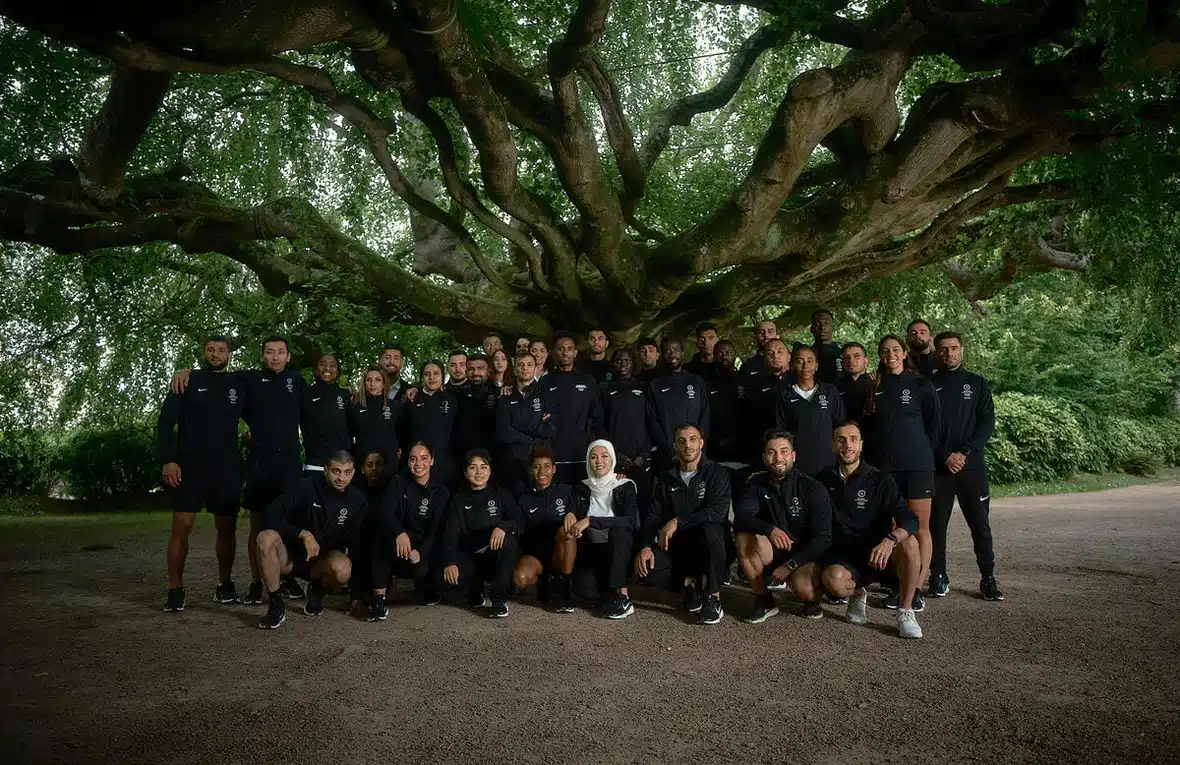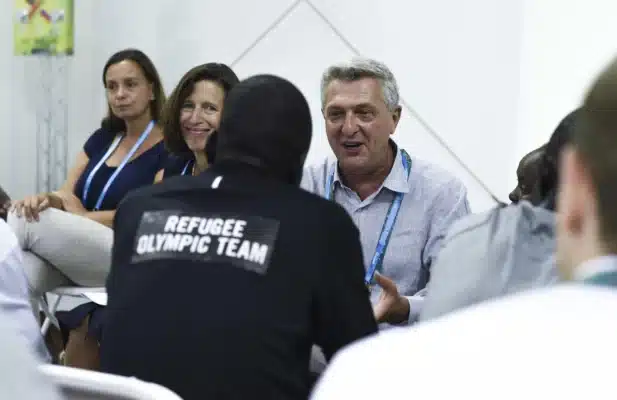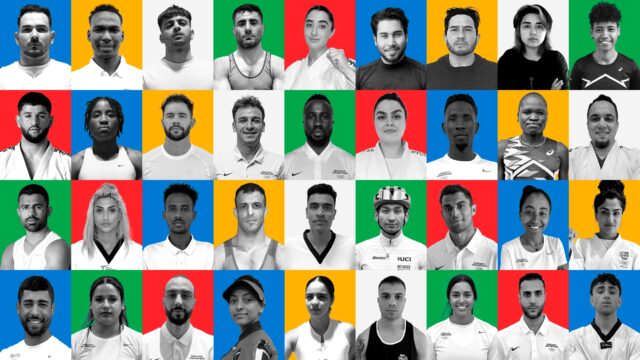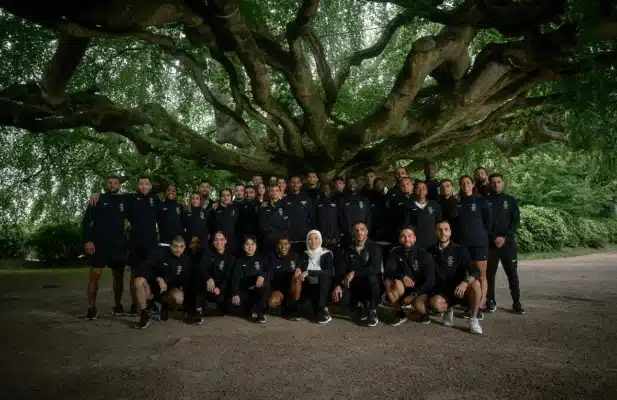
Members of the Refugee Olympic Team during the opening ceremony in Paris on Friday. © IOC/David Burnett
Members of the 37-strong team have overcome extraordinary odds to reach the globe’s highest sporting stage and carry the hopes of some 120 million displaced people worldwide
By UNHCR staff
Journeying down the Seine through the historic heart of a rainy Paris, cheered on by spectators lining both banks of the river, the IOC Refugee Olympic Team made its entrance at the Paris 2024 Olympic Games opening ceremony on Friday night in a spectacular floating parade.
The 37-strong team will compete across 12 sports, each having beaten extraordinary odds to take their place at the world’s largest and most prestigious sporting event. Over the next two weeks, they will represent the hopes and dreams of some 120 million forcibly displaced people worldwide.
Previously, refugees and asylum-seekers were largely excluded from competition at national, regional and international levels. But since the first Refugee Olympic Team, comprising 10 athletes, competed at the Rio 2016 Games, capturing the imagination of sports fans around the world, more and more sports federations and associations have found ways to include refugee athletes and teams in major sporting events.
At the Tokyo 2020 Games, 29 refugee athletes took part, including Masomah Ali Zada, who competed in road cycling. In Paris, she will lead the largest team yet as its Cheffe de Mission and spokesperson.
“In Tokyo, we just missed out on a medal. I’m confident that this time we can demonstrate to the world what refugees are capable of – with an Olympic medal,” said Masomah.

The Refugee Olympic Team make their way down the Seine as part of the Opening Ceremony parade of athletes on Friday evening. Miguel Medina/AFP/Getty Images
Travelling behind Greece, which traditionally leads the parade of nations, the refugee team’s boat was second in a fleet of 94 carrying national delegations down the Seine, and received one of the biggest cheers of the evening.
UK-based boxer Cindy Ngamba and Yahya Al Ghotany, who practises taekwondo in Jordan’s Azraq Refugee Camp, were the team’s flag bearers.
“I’m just one of millions … there are many refugees out there, just like me, who have not been given the opportunity [that we have], who will be watching the Olympics – and hopefully we can inspire them to believe in themselves and believe that through hard work, through hardship, you can strive in life and achieve miracles,” said Ngamba earlier this week.
© UNHCR
Overcoming the odds
Besides the trauma and upheaval of displacement, the athletes have had to overcome disruptions to training and challenges securing funding, coaching and equipment to compete at the highest level and secure their place on the team.
To be eligible, they had to excel in their respective sports. Most received support during their training through the Refugee Athletes Scholarship Programme, which is managed by the Olympic Refuge Foundation (ORF) and funded by the International Olympic Committee (IOC). UNHCR, the UN Refugee Agency, verified their refugee status as determined by their host country. In the run-up to Paris, more than 70 refugee athletes were supported with scholarships while the final team selection was announced by the IOC in early May.
“With your participation in the Olympic Games, you will demonstrate the human potential of resilience and excellence. This will send a message of hope to more than 100 million displaced people around the world,” said IOC President Thomas Bach.
Before arriving at the Olympic Village in Paris this week, the team spent several days in the town of Bayeux in Normandy, training together and bonding over their shared experiences.
“We all hear about these words: courage, solidarity, sacrifice, peace and love – and I had the chance to really feel them and live them,” said canoeist Saman Soltani, reflecting on her time in Bayeux with the rest of the team.

The Refugee Olympic Team in Bayeux, Normandy where they gathered for a pre-Games training camp before travelling to Paris. © IOC/John Huet
‘A symbol of hope and peace’
The elite athletes who have made the team for Paris only tell a small part of the story of how sport can transform the lives of people forced to flee.
Writing recently for El Pais, Pur Biel, a UNHCR Goodwill Ambassador who competed as a runner in the first Refugee Olympic Team and who will be among those handing out medals in Paris, recalled what sport meant to him after he fled his native South Sudan and found safety in Kenya’s Kakuma refugee camp: “I discovered a love for sport, especially through playing football with my classmates. All of us came from different places … It was sport that brought us together. It gave us a sense of belonging, community and, most importantly, hope.”
UNHCR works with partners, including the ORF and IOC, to bring sports to refugee camps, settlements and urban settings around the world – building sports grounds and pitches, contributing equipment and supporting sports activities in schools attended by displaced young people.
- See also: At Paris Olympics opening, UNHCR’s Grandi hails refugee athletes as beacon of hope and peace
“I have seen how sports can change lives, help people belong, be motivated, find hope again,” said UN High Commissioner for Refugees Filippo Grandi.
During the opening ceremony, Grandi was honoured with the Olympic Laurel for his work using the power of sport to improve the lives of refugees and other displaced people. The High Commissioner is the third recipient of the Laurel, which was created by the IOC to honour individuals for outstanding achievements in education, culture, development and peace through sport.
He dedicated the award to all those forced to flee their homes and to all those supporting them. Speaking about the Refugee Olympic Team, he said: “They’re an inspiration to us all. With determination and given the chance, anything is possible.”
At the Maison de Réfugiés in Paris on Friday night, refugees living in the city came together to watch the opening ceremony and catch their first glimpse of the Refugee Olympic Team.
“It was very moving, very touching,” said Hanieh, a former refugee from Iran. “I’m thinking about all the people in front of the TV tonight, watching the show, and feeling they are being represented, and that they have a voice … and they matter.”
“They deserve to be there,” he added. “They earned their place on that boat, and in the Olympic Games, and we are very proud of them.”
Originally published by UNHCR on 27 July 2024.





